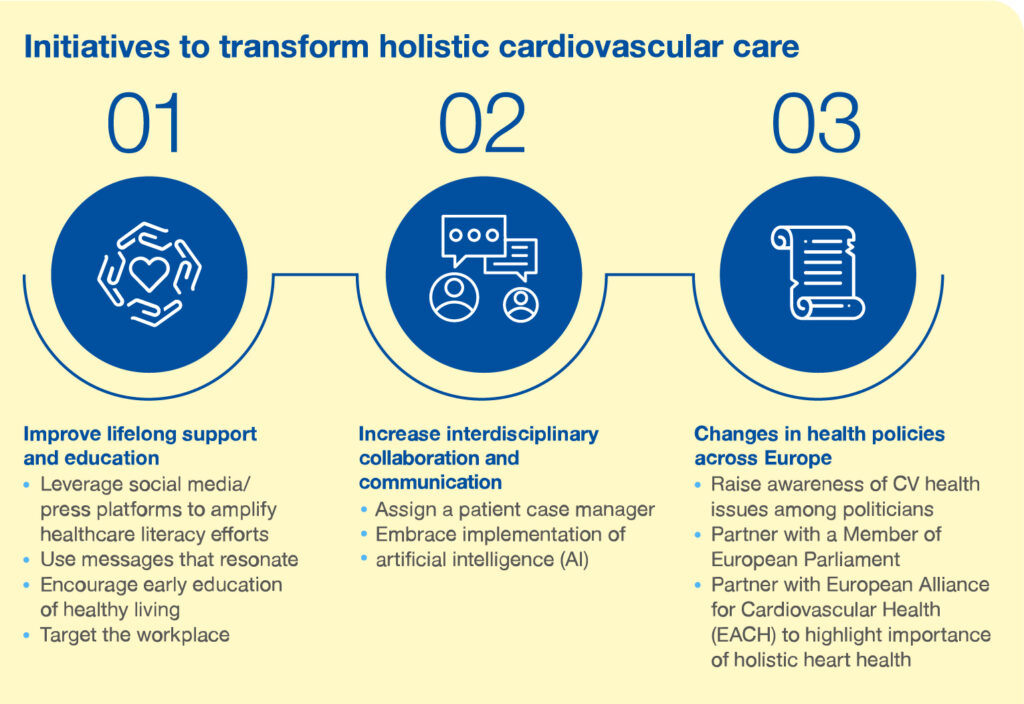Cardiovascular disease (CVD) is the leading cause of death in Europe, responsible for more than 10,000 lives lost every day.1,2, However, CVD – a collective term designating various disorders of the heart and blood vessels – is a largely preventable disease, and 80% of premature heart disease and stroke cases could be prevented.3 With more than 60 million people living with CVD across Europe, there is a growing emphasis on managing CVD through behavioural changes and risk factor management, such as adopting a healthy diet and increasing physical activity.4
At Daiichi Sankyo Europe (DSE), we recognise that improving the prevention and care of CVD requires a holistic approach with a multidisciplinary team of experts. So, earlier this year, we brought together influential representatives from various healthcare disciplines across Europe who share our commitment to redefining heart health and care.
“Collaborating with a diverse array of stakeholders is paramount in adopting a truly holistic approach to heart health in Europe. By harnessing the unique perspectives and expertise of individuals across disciplines, sectors, and backgrounds, we can forge innovative solutions that address the challenges facing cardiovascular health today. Together, we can drive meaningful change and pave the way towards a healthier future for all.”
Oliver Appelhans – Head of Specialty Business, Daiichi Sankyo Europe
First-of-its-kind Think Tank
In January 2024, the Future of Heart Health in Europe: A Holistic Care Think Tank held its inaugural meeting, reviewing the significant barriers to holistic cardiovascular (CV) care. The challenges explored included misinformation, limited communication, funding constraints and societal pressures. Clinicians, patient advocates, researchers, digital and media experts and policy specialists came together to discuss how a shift towards holistic CV care in Europe can be realised. Participants included halo health-related professionals – experts with a broad range of specialities including a focus on behavioural and physiological risk factors, such as diet, exercise and mental health. These experts play a vital role in raising awareness of the various aspects of CVD and, together, can build a complete picture of a person’s health that goes beyond the view of the heart alone.
“It should be a top priority to look at heart health holistically and encourage an exchange between experts of different fields. If we look at the data, we see that there is a large number of factors that influence cardiovascular health. Many of these factors go beyond the traditional risk factors like blood pressure, cholesterol, and they include diet or exercise or also mental health. If we want to optimise patient care, I would say it is a priority to have a more holistic view of cardiovascular health, especially in clinical settings.”
Claudia Garbrecht, Psychologist, Germany
Recommendations for tangible change
To drive meaningful action towards a holistic approach to CV care in Europe, the Think Tank proposed recommendations in three key areas:
- Improve support and education for patients: Health education in schools can equip children with the knowledge needed to make informed decisions about their heart health from an early age. This lays a strong foundation for lifelong wellness. Workplace wellness programmes can incentivise healthy behaviours in later life.
- Increase interdisciplinary collaboration and communication: There is a pressing need for improved communication between healthcare professionals (including clinicians and halo health-related professionals such as dieticians and psychologists). Furthermore, patients need to feel empowered to take control of their health. Improving communication between patients and healthcare professionals, together with more accessible patient information, will support patient empowerment and better coordination of care.
- Changes in health policies across Europe: For change to occur at a national level, advocacy and a representative voice in Europe are needed to ensure a holistic view of CV care is included on political agendas. Policy changes will lead to better access to preventive care, support for adoption of a healthy lifestyle, and removal of barriers to equitable healthcare.
“I think it’s most important that we come together and that we include the right stakeholders. We need to include the decision-makers because we can have the science, but we need implementation.”
Joost Wesseling, European Nutrition for Health Alliance
The strategic recommendations proposed by the Think Tank reflect a proactive approach to transforming holistic heart health today. A clear emphasis on the importance of collaboration across disciplines (including clinicians and halo health-related professionals) and prioritisation of the needs and well-being of patients is central within these recommendations. By fostering collaboration and embracing a holistic mindset, together we can help drive tangible change in the prevention, diagnosis and treatment of CVD across Europe.
Read the full report here: Future of Heart Health in Europe: Holistic Care Think Tank Report



